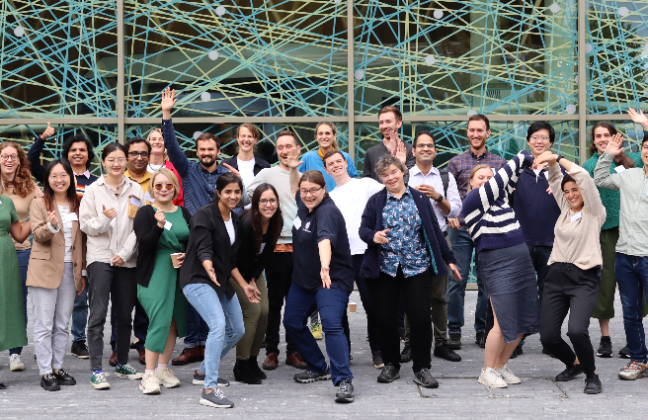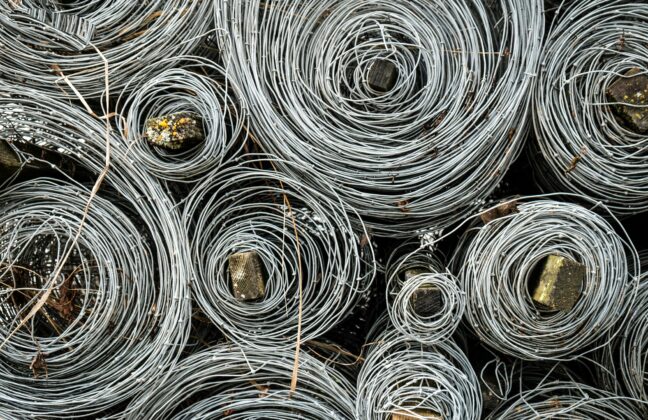Thursday 8th – Friday 9th of September saw the return of the annual NICER Programme ECR (Early Career …
News

Second Round of Funded Circular Economy Feasibility Studies Announced!
The CE Hub is delighted to announce six ground-breaking CE projects to be funded through the CE-Hub Feasibility Study Funding. All six projects focus on creating real change and developing circularity within a unique sector or for a specific material. The funded projects will be:
- Digital Decarbonisation: Data Recovery, Recycling, Reuse, and Remaining Useful Life for Digital Circularity.
Research Team: Professor Tom Jackson (PI), Dr Ed Barbour, Professor Lisa Jackson, Professor Ian Hodgkinson. Hosted by Loughborough University, with collaborators NPL.
This project will focus on building the foundations of a ‘metal decarbonisation dashboard’. The aim of this ‘dashboard’ is to enable organisations to evaluate their metal digital carbon footprint over the lifecycle of their metal components, and to deliver system level change to their data collection. The study will be centred around four data pillars: recovery, recycling, re-using, and remaining data life, and the key and innovative aims of this study are to provide a unique understanding of the data needs across all lifecycle stages of metals for carbon footprint determination, and to align the concept of digital data decarbonisation with the circular economy.
- The Old Pants Project: Mycoremediation Of Waste Textiles.
Research Team: Dr Suzy Moody (PI). Hosted by Kingston University, with collaborators Bamboo Clothing Ltd.
This project presents an exciting opportunity to combat to develop circularity for textiles. Pants are made from a mixture of natural-derived textiles such as cotton and petroleum derived plastic textiles such as nylon and elastane to improve fit. This combination of materials renders them difficult to recycle, meaning that new and innovative methods of waste management must be explored. Fungi previously shown to degrade laboratory nylon belong to the same group as many edible mushrooms, and The Old Pants Project will be studying this use of textile waste as a substrate to farm mushrooms for consumption. This process of farming fungi from waste textiles has multiple benefits: generating value from waste, reducing microplastics in soil, and being able to generate a vegan source of protein in the low-income countries that bear the joint burdens of high levels of malnutrition, and textile pollution.
- Circular Cricket Gear [CCG]: Concepts And Materials For The Circular Design Of Gloves And Balls.
Research Team: Professor Martin Charter (PI), Dr Lilian Sanchez Moreno, Ros Carruthers, Joanna Czutkowna, Dr Darshil U. Shah. Hosted by the University of the Creative Arts (UCA), with collaborators Gunn & Moore, Annas Annan, Fibral Material Alliance, Joe Cooke, and BASIS.
CCG will focus on the feasibility of circular design of cricket gear, specifically gloves and balls. The project team states that whilst cricket is the 2nd largest sport in the word, and is highly gear intensive, the sport has been slow to take on sustainability concerns, and most changes have been focused on venues, facilities, and grounds. CCG is looking to change this, by examining circular concepts and options for cricket gloves and cricket balls, the implications of using alternative materials, and whether new materials could be developed as a substitute for animal leather and cork. Through developing prototypes and evaluating the feasibility of circular design within cricket, CCG promises to create significant and real-world change to the sport.
- Application Of Recycled Carbon Black In Printable Electronic And Photovoltaic Devices.
Research Team: Professor Elizabeth Gibson (PI), Dr Susana Iglesias Porras, Delowar Hossain. Hosted by Newcastle University, with collaborators RAF Leeming and Wastefront.
This project will focus on to providing data to assess the potential for recycled carbon black from waste tyres to be applied in printable electronic, electrochemical, and photovoltaic devices. Approximately 29 million metric tonnes of vehicle tyres reach the end of their lifespan each year, with 10% going to landfill, and most being incinerated. This innovative project, will use material recovered from recycled tyres to prepare a carbon ink, which will then be tested for its electronic and electrochemical properties, and applied in printable solar cells. The performance of these carbon ink solar cells will be evaluated under both simulated and real sunlight conditions, and other applications of the ink will be explored. This interdisciplinary project will connect waste processing and material recovery with the advanced manufacturing and energy sectors.
- Circular Mass Timber For Construction: Adhesive-Free Bonding Of Recovered Timber For Structural Mass Timber Production.
Research Team: Dr Kate Franklin (PI), Dr Colin Rose. Hosted by The Welding Institute.
UK construction is responsible for the extraction of more than half a million tonnes of materials each day. Despite timber being the only commonly used structural building material that is renewable, timber supply has been identified as a future resource risk, highlighting the need to improve the end life of this material. Currently, many timber-based building materials, and materials that use timber recovered from demolition, are reliant on adhesives containing formaldehyde or isocyanates, resulting in levels of carcinogenicity and toxicity that can be harmful during production, in use, and at end-of-life. The Circular mass timber for construction: Adhesive-free bonding of recovered timber for structural mass timber production project aims to develop linear friction welding of timber, a process that can join timber in a matter of seconds, without the need for adhesives. This process has a long history of use in metals and more recently polymers, but is relatively new in the timber sector. It has not previously been applied in the production of mass timber products, or indeed on secondary timber, meaning that this project has ground-breaking potential for implementing CE in this sector.
- Investigation on Plasma Sprayed Coatings of Cement By-Pass Dust and Similar Industrial Wastes
Research Team: Professor Saurav Goel (PI), Dr Pravat Ranjan Pati. Hosted by London South Bank University.
This project will focus on plasma spay of ceramic coatings using cement by-pass dust, stone dust and other industrial wastes. Plasma spraying is used to apply a variety of coatings in several industry sectors. These coatings are designed to provide wear and corrosion protection, or to give functional properties such as thermal insulation or biocompatibility. Traditionally, plasma sprayed ceramic coatings are made from conventional materials, keeping this sector linear. However, this feasibility study will focus on the development of plasma spay of ceramic coatings from a variety of construction by-products, such as cement by-pass dust, stone dust, and other industrial wastes. This study will explore the viability for potential zero waste routes in the preparation of surface coatings, creating value from a variety of construction by-products that would otherwise be wasted.
These projects have been funded as part of the second round of the CE Hub’s £500,000 CE-Hub Feasibility Study Fund. A further call is planned for 2023 for Feasibility Studies with a value of up to £50,000. To find out more about the projects funded in our first round in 2021, click here. To keep up to date with further updates and announcements relating to the CE-Hub Feasibility Fund, sign up to our quarterly eNewsletter using the form at the bottom of this page.






